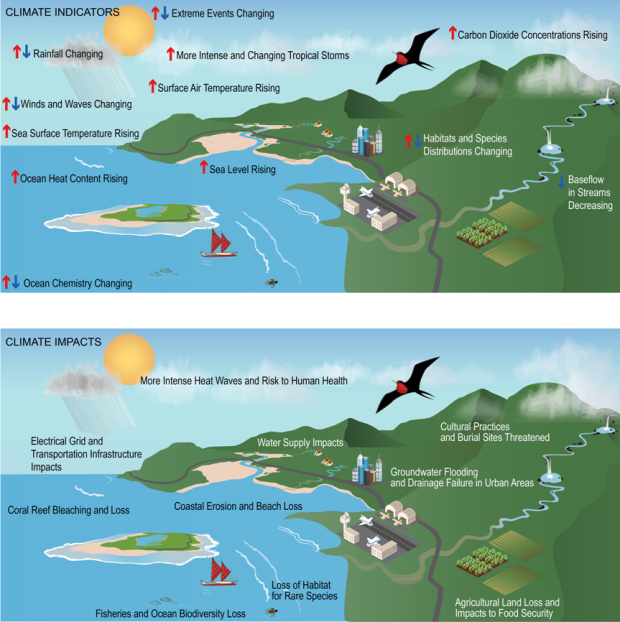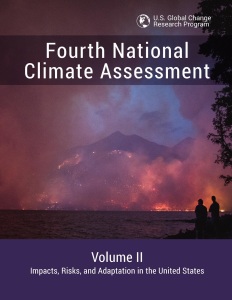Fourth National Climate Assessment: Chapter 27 – Hawaiʻi and US-Affiliated Pacific Islands
A chapter on Hawai‘i and the US-Affiliated Pacific Islands appears in Volume II of the Fourth National Climate Assessment, the most significant US report to assess the effects of climate change on the US economy and communities. The Assessment was released in November 2018.
Chapter 27 describes changes already being felt in Hawai‘i and Pacific Islands, as well as what lies ahead. The top findings include:
- Dependable and safe water supplies are threatened by rising temperatures, changing rainfall patterns, sea level rise, and increased risk of extreme drought and flooding. Islands are already experiencing saltwater contamination due to sea level rise, which is expected to catastrophically impact food and water security, especially on low-lying atolls.
- Sea level rise has accelerated and is now damaging critical infrastructure such as transportation and housing, as well as beaches, ecosystems and cultural sites. In Hawai‘i, the value of all structures and land expected to be flooded by 2100 amounts to more than $19 billion statewide. The Pacific Islands will experience sea level rise higher than the global average, projected to further accelerate strongly after mid-century. Adaptation strategies that are implemented sooner can better prepare communities and infrastructure.
- Increasing ocean temperatures and acidification threaten fisheries, coral reefs, and the livelihoods they support. Widespread coral reef bleaching and death are occurring more frequently, and by mid-century these events are projected to occur annually, especially if current trends in greenhouse gas emissions continue. Bleaching and acidification will result in loss of reefs, leading to lower fisheries yields and loss of coastal protection and habitat.
- These changes imperil Indigenous peoples’ health and well-being and their relationships with lands, territories, and cultural resources.
- Climate change reduces the ability of habitats to support protected plant and animal species. Changes promote the spread of invasive species, threatening biodiversity, important to island people and a source of economic revenue. Some species are expected to become extinct and others to decline to the point of requiring costly protection.

About the Fourth National Climate Assessment
Mandated in the Global Change Research Act passed by Congress in 1990, the National Climate Assessment synthesizes the state of climate knowledge and assesses climate change impacts, risks, and adaptation across the United States every four years. The main objective is to help Americans better identify, avoid, and/or reduce climate-related risks. The National Climate Assessment process relies on consensus and undergoes extensive review.
Volume II of the Fourth National Climate Assessment builds upon the physical science assessment presented in Volume I, the Climate Science Special Report, released in November 2017. Vol. II places a strong emphasis on regional information, addressing the impacts of climate change on 10 regions of the United States. It also evaluates the risks from climate changes across 15 national-level topics, often using case studies to provide additional context and showcase community success stories.
The report was written by more than 300 Federal and non-Federal authors representing a range of expertise, a number of whom were selected through a public call for nominations. The Hawai‘i and Pacific Islands chapter has 11 authors and 77 regional contributors, and is backed by more than 250 citations from published articles, reports, and books.
For further information, please contact Zena Grecni, Sustained Climate Assessment Specialist at the East-West Center, via email at GrecniZ@EastWestCenter.org or by phone at (808) 944-7242.
Special thanks to the 77 technical contributors to the Hawai‘i and Pacific Islands chapter of the Fourth National Climate Assessment and to the Pacific Islands Climate Adaptation Science Center (PI-CASC) and the Pacific Regional Integrated Sciences and Assessments (RISA) for their financial support for the chapter development process.

